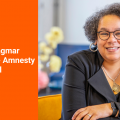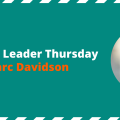
Thought Leader Thursday – Dagmar Oudshoorn: 'Human rights are a starting point, not a choice'.
In the interview series 'Thought Leader Thursday' we speak to an expert in the field of a specific issue every Thursday. This time we talk to Dagmar Oudshoorn, who has been director of Amnesty Netherlands since January 1, 2020.
How were you doing before the corona crisis broke out?
When I started on January 1 last year, we were mainly concerned with the human rights work that we always do. Amnesty is a global movement that focuses on international themes such as the abuses surrounding the Uighurs and women's rights in Saudi Arabia. We have also been working on campaigns in the Netherlands. We have started a lawsuit against ethnic profiling in the military police. Another major campaign was against amending the moral law, as Minister Grapperhaus proposed. The minister made a distinction between 'rape' and 'sex against the will' and we did not agree with this.
During my training period, I had to send my entire office home on March 12. That coincided exactly with the start of our collection week. This is an important week for us: Amnesty does not receive any resources from the government, except when it comes to education. We are independent and do not want to be influenced by the government.
Due to the lockdown, we had to completely change the way we worked. We always carry out many actions and come together in larger groups for demonstrations, for example. Membership recruitment, fundraising, all the groups we have throughout the country all had to be organized differently.
We have had to adapt to a different way of working, but the content has remained the same. However, an additional dimension was added: how human rights are dealt with in times of corona. The contradictions in society have been magnified in this crisis. For example, people who are the first to have access to care. Regimes sometimes compromised on the preservation of the rule of law, under the guise of combating the pandemic. This increases the problems surrounding human rights that already existed. It is difficult to regain the freedoms that are restricted in this way. Even in England, far-reaching legislation regarding corona has been adopted without an end date. Of course, a pandemic must be tackled, but the measures must remain proportionate. It should not lead to human rights being truly compromised. Regimes that normally do not take human rights very seriously have certainly not improved this in these corona times. In China, for example, journalists have been arrested, and in Hungary parliament was temporarily sidelined. In the Netherlands we were concerned about the corona app, but also about people in immigration detention.
Has awareness of human rights increased?
Yes and no. For example, around the benefits affair, the operation of algorithms has received more attention, something we have been highlighting for some time. But a phenomenon that we also see a lot in society is the idea of 'one's own human rights first'. People talk about their rights, but do not always grant others the same rights. Of course there may be restrictions on freedom, Amnesty is not against measures. As long as these are temporary and verifiable. They must be linked to the problem and well substantiated. The right to health is also a human right, but democratic control must be guaranteed.
People are sometimes angry with Amnesty in this context. These discussions are sometimes quite difficult. It is important that we explain what we do and why we do it: our working method is to place the restrictions against a democratic bar: are they done in accordance with the rules and treaties.
How is the Netherlands doing in the field of human rights? Should we be more concerned about the human rights situation in the Netherlands in recent years?
Amnesty is a global movement, but it is not without reason that we are also active in the Netherlands. Here too there are abuses that we need to look at. Ethnic profiling is one of those things. Although we live in a constitutional state, we do not always act in accordance with Article 1 of the Constitution. We also see that matters are not always well thought through, the benefits affair is a very clear example of this.
How does your work continue during this lockdown?
Our annual collection will take place online. In terms of fundraising, we are also looking at new ways. In terms of content, we are doing our normal work again, this has not changed. We've had to think of different ways to do our work. We have had to adapt to all recruitment, for example at festivals. The annual letter writing campaign was done entirely online this year and more letters were written than ever! We have also discovered that we have been able to attract new groups in this way, such as young people.
Have there been any completely new topics on the agenda?
We are in the process of establishing a new strategy worldwide. Each country also looks at its own priorities. The Netherlands has traditionally focused more on civil and political rights. For example, other countries place more emphasis on cultural rights.
On our website you can see all the actions we take and for which people can also sign petitions, for example. And that certainly makes sense to draw: a good example from last week is the success of Loujain al-Hathloul from Saudi Arabia, who was wrongfully imprisoned and was now allowed to go home. Everyone around the world is very happy that we have achieved this together by putting pressure on national and international politics. This is the visible added value of the work we do and it can be followed by everyone. The personal effect of those letters and our volunteers is enormous.
In preparation for the elections, we participate in a debate in which we question political parties about the future. Issues such as the environment and international development cooperation are then discussed. Before the election manifestos were adopted, we sent many letters to ensure that human rights were included in the party manifestos.

